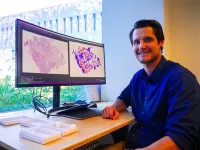(Press-News.org) A new large study led by researchers at the American Cancer Society (ACS) suggests incidence rates continued to rise in successively younger generations in 17 of the 34 cancer types, including breast, pancreatic, and gastric cancers. Mortality trends also increased in conjunction with the incidence of liver (female only), uterine corpus, gallbladder, testicular, and colorectal cancers. The report will be published today in the journal The Lancet Public Health.
“These findings add to growing evidence of increased cancer risk in post-Baby Boomer generations, expanding on previous findings of early-onset colorectal cancer and a few obesity-associated cancers to encompass a broader range of cancer types,” said Dr. Hyuna Sung, lead author of the study and a senior principal scientist of surveillance and health equity science at the American Cancer Society. “Birth cohorts, groups of people classified by their birth year, share unique social, economic, political, and climate environments, which affect their exposure to cancer risk factors during their crucial developmental years. Although we have identified cancer trends associated with birth years, we don’t yet have a clear explanation for why these rates are rising.”
In this analysis, researchers obtained incidence data from 23,654,000 patients diagnosed with 34 types of cancer and mortality data from 7,348,137 deaths for 25 types of cancer for individuals aged 25–84 years for the period Jan 1, 2000, to Dec 31, 2019, from the North American Association of Central Cancer Registries and the U.S. National Center for Health Statistics, respectively. To compare cancer rates across generations, they calculated birth cohort-specific incidence rate ratios and mortality rate ratios, adjusted for age effect and period effect, by birth years, separated by five-year intervals, from 1920 to 1990.
Researchers found that incidence rates increased with each successive birth cohort born since approximately 1920 for eight of 34 cancers. In particular, the incidence rate was approximately two-to-three times higher in the 1990 birth cohort than in the 1955 birth cohort for pancreatic, Kidney, and small intestinal cancers in both male and female individuals; and for liver cancer in female individuals. Additionally, incidence rates increased in younger cohorts, after a decline in older birth cohorts, for nine of the remaining cancers including breast cancer (estrogen-receptor positive only), uterine corpus cancer, colorectal cancer, non-cardia gastric cancer, gallbladder cancer, ovarian cancer, testicular cancer, anal cancer in male individuals, and Kaposi sarcoma in male individuals. Across cancer types, the incidence rate in the 1990 birth cohort ranged from 12% for ovarian cancer to 169% for uterine corpus cancer higher than the rate in the birth cohort with the lowest incidence rate. Notably, mortality rates increased in successively younger birth cohorts alongside incidence rates for liver cancer (female only), uterine corpus, gallbladder, testicular, and colorectal cancers.
“The increase in cancer rates among this younger group of people indicate generational shifts in cancer risk and often serve as an early indicator of future cancer burden in the country. Without effective population-level interventions, and as the elevated risk in younger generations is carried over as individuals age, an overall increase in cancer burden could occur in the future, halting or reversing decades of progress against the disease,” added Dr. Ahmedin Jemal, senior vice president, surveillance and health equity science at the American Cancer Society and senior author of the study. “The data highlights the critical need to identify and address underlying risk factors in Gen X and Millennial populations to inform prevention strategies.”
"The increasing cancer burden among younger generations underscores the importance of ensuring people of all ages have access to affordable, comprehensive health insurance, a key factor in cancer outcomes," said Lisa Lacasse, president of the American Cancer Society Cancer Action Network (ACS CAN). "To that end, ACS CAN will continue our longstanding work to urge lawmakers to expand Medicaid in states that have yet to do so as well as continue to advocate for making permanent the enhanced Affordable Care Act tax subsidies that have opened the door to access to care for millions."
Other ACS researchers participating in the study include: Chenxi Jiang, Dr. Priti Bandi, Dr. Farhad Islami, and Rebecca Siegel.
# # #
About the American Cancer Society
The American Cancer Society is a leading cancer-fighting organization with a vision to end cancer as we know it, for everyone. For more than 110 years, we have been improving the lives of people with cancer and their families as the only organization combating cancer through advocacy, research, and patient support. We are committed to ensuring everyone has an opportunity to prevent, detect, treat, and survive cancer. To learn more, visit cancer.org or call our 24/7 helpline at 1-800-227-2345. Connect with us on Facebook, X, and Instagram.
END
Generation X and millennials in US have higher risk of developing 17 cancers compared to older generations, new study suggests
2024-08-01
ELSE PRESS RELEASES FROM THIS DATE:
Around 160,000 joint replacement surgeries lost by COVID-19 pandemic, study finds
2024-08-01
Nearly nine months of joint replacement surgery has been lost - around 160,000 fewer operations – since the start of the COVID-19 pandemic, a new study led by the University of Bristol has found. The research suggests returning to pre-pandemic levels will not tackle the backlog, and even with rapid expansion, it will take many years, if not decades, to fix this joint replacement crisis.
The study, published in The Bone & Joint Journal today [1 August], looked in detail at the effect ...
Public health measures that reduce dementia risk could save up to £4bn
2024-07-31
Public health interventions that tackle dementia risk factors could yield as much as £4bn in savings in England by reducing dementia rates and helping people to live longer and healthier, finds a new study led by UCL researchers.
The study, published in The Lancet Healthy Longevity, shows that interventions – such as reformulating food products to reduce sugar and salt intake, introducing low emission zones to improve air quality in cities, and minimum alcohol unit pricing to reduce drinking – could have extensive benefits beyond just the health outcomes they are directly targeting.
Lead author Dr Naaheed Mukadam (UCL Psychiatry) ...
The Lancet: Nearly half of dementia cases could be prevented or delayed by tackling 14 risk factors starting in childhood, including two new risks—high cholesterol and vision loss
2024-07-31
Vision loss and high cholesterol add to 12 previously identified modifiable risk factors for dementia, concludes a new report from the 2024 Lancet Commission.
The potential to prevent and better manage dementia is high if action to tackle these risk factors begins in childhood and continues throughout life, even in individuals with high genetic risk for dementia.
New report outlines 13 recommendations for individuals and governments to help reduce risk, including preventing and treating hearing loss, vision loss, and depression; being cognitively active ...
Precision oncology via artificial intelligence on cancer biopsies
2024-07-31
A new generation of artificial intelligence (AI) tools designed to allow rapid, low-cost detection of clinically actionable genomic alterations directly from tumor biopsy slides has been developed by a team led by engineers and medical researchers at University of California San Diego.
A paper describing the new AI protocol for examining routine biopsies, called DeepHRD, was recently published in the Journal of Clinical Oncology.
Senior author Ludmil Alexandrov, Ph.D., professor of bioengineering and professor of cellular and molecular medicine at UC San Diego, says the new method is designed to save weeks and thousands of dollars from clinical oncology treatment workflows ...
What you don't know about endometrial cancer could kill you
2024-07-31
CLEVELAND, Ohio (July 31, 2024)—Despite the fact that endometrial cancer is the most common cancer of the female reproductive organs, a significant percentage of women do not know that postmenopausal bleeding is a key warning sign of the disease. Worse, even fewer women report having received any type of counseling on the subject from their healthcare professionals. That’s according to a new study published online today in Menopause, the journal of The Menopause Society.
It is estimated that 67,880 new cases of ...
Does it matter that the ovaries are the most rapidly aging organs in the female body?
2024-07-31
CLEVELAND, Ohio (August 1, 2024)—Because of the aging of the ovaries, a woman’s fertility gradually declines, and she eventually enters menopause. The onset of menopause puts women at a significantly higher risk of various diseases such as cardiovascular disease and osteoporosis. A new study suggests that a shorter reproductive lifespan is linked with a higher risk of multimorbidity. Results of the survey are published online today in Menopause, the journal of The Menopause Society.
The effect of reproductive-related factors on women’s health has become a focus of interest and study in recent years. Previous studies have identified the ...
Serotonin uptake regulates ependymoma tumor growth
2024-07-31
(MEMPHIS, Tenn. – July 31, 2024) Do neurons play a role in brain tumor growth and development? Scientists at St. Jude Children’s Research Hospital and Baylor College of Medicine have evidence showing that, for childhood ependymomas, they do. There are no targeted therapies available to treat ependymoma due in large part to a lack of understanding of the tumor microenvironment. By leveraging a recently developed murine model, scientists explored the interaction between ependymoma cells and surrounding neurons. They found that hyperactivation of a specific subset ...
Scientists set sail to study Greenland glaciers from underwater
2024-07-31
The University of Texas at Austin has embarked on a mission to explore the underwater edges of Greenland’s coastal glaciers to learn more about future sea level rise.
The four-week expedition conducted with international partners will investigate processes that control how these giant glaciers melt and what that means for the future of the Greenland ice sheet, which has about 23 feet (7 meters) of potential sea level rise locked away in its ice.
Joining the researchers is a robotic submersible that will gather measurements of the glaciers’ underwater walls and sediment-laden meltwater, a feat that’s never been ...
Smell reports reveal the need to expand urban air quality monitoring, say UBC researchers
2024-07-31
Ever wondered if your neighbourhood odour could be impacting your health? University of British Columbia researchers have uncovered surprising insights into the Vancouver region's “smellscape” using data from the Smell Vancouver app. Analyzing 549 reports from one year of app data, they discovered that “rotten” and “chemical” odours dominated, making up about 65 per cent of submissions. These unpleasant smells were linked to self-reported health issues like headaches and anxiety, leading some residents to change their behaviours, like closing windows even in stifling-hot weather.
“The ...
Type 1 diabetes: UAB startup gains FDA clearance to test novel oral drug
2024-07-31
BIRMINGHAM, Ala. – The University of Alabama at Birmingham startup TIXiMED, Inc., has obtained clearance from the United States Food and Drug Administration to proceed to clinical trials under an Investigational New Drug for TIX100, its novel oral Type 1 diabetes drug. This represents a major milestone in the development of this new approach to T1D treatment and gives TIXiMED the green light to start human studies with TIX100.
The development of TIX100 is based on decades of research by Anath Shalev, M.D., the Nancy R. and Eugene C. Gwaltney Family Endowed Chair in Juvenile Diabetes Research in the UAB Division ...




